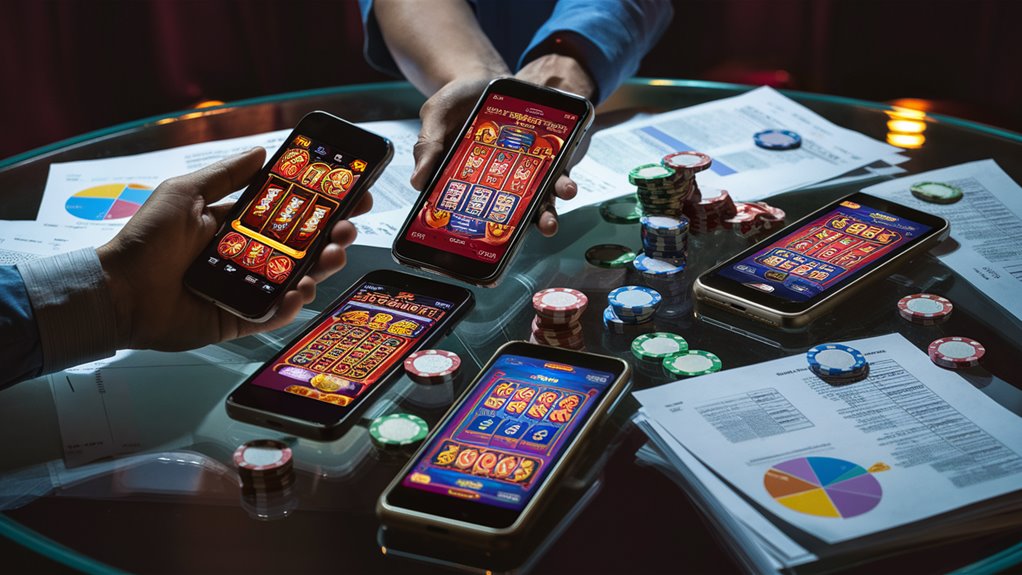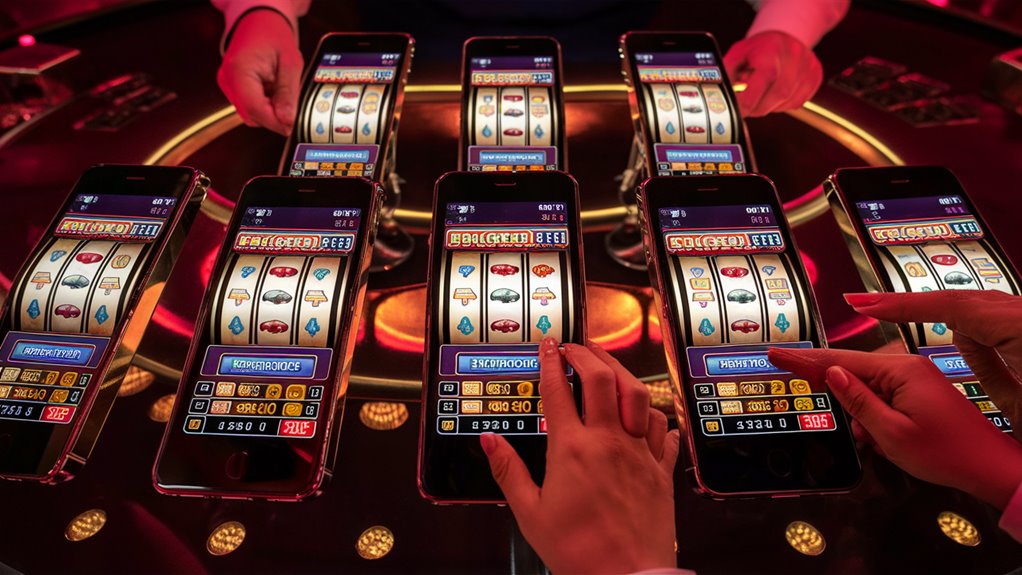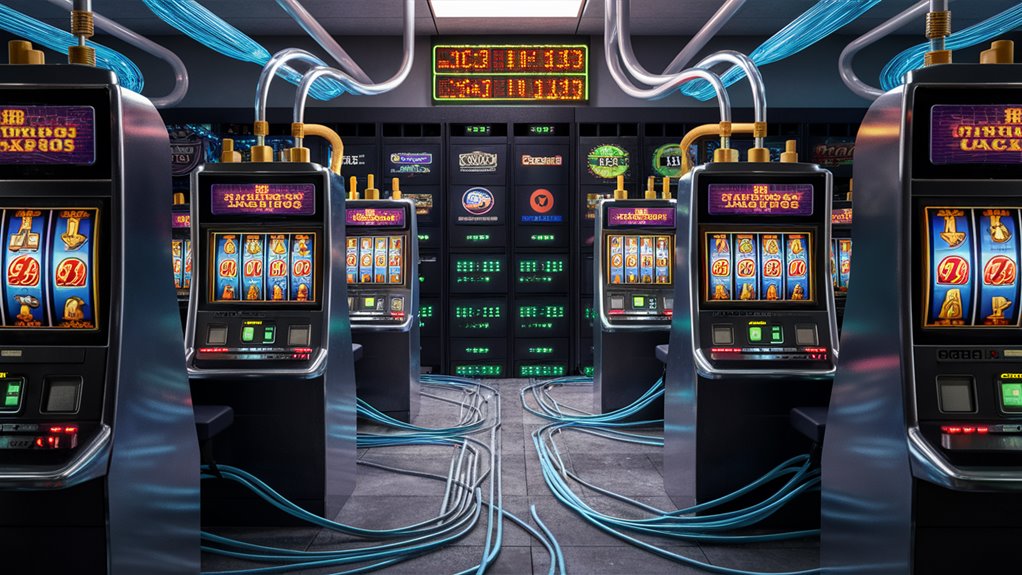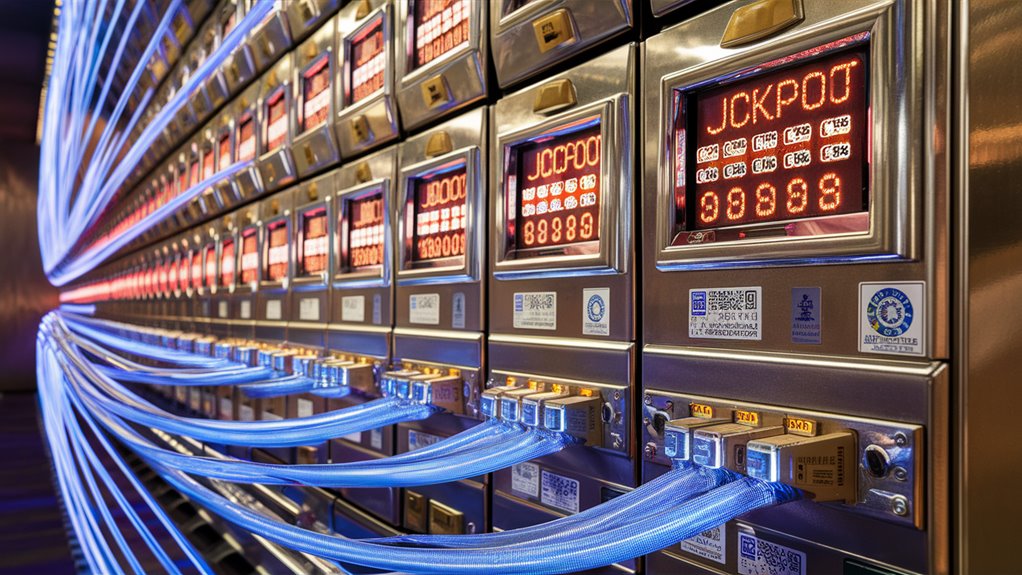Have you ever wondered how those massive online slot jackpots get so big? Well, it’s actually a pretty clever system that’s more interesting than you might think. Picture thousands of players, all dropping small amounts into virtual slot machines across different casinos. Each spin adds a tiny piece to what eventually becomes those eye-popping jackpot numbers we see advertised.
The whole thing works like a giant digital piggy bank, really. Every time someone plays a connected slot game, a small percentage of their bet goes into the shared jackpot pool. It’s not much per player, maybe just a few cents here and there, but when you multiply that by thousands of players spinning away 24/7, those numbers start climbing fast.
What’s really cool is how different online casinos work together on this. They’re basically creating a network where players at Casino A are helping build the same jackpot that players at Casino B are chasing. The casinos split the costs and risks between them, which means they can offer bigger prizes than they could on their own.
Behind all this is some pretty sophisticated math and psychology. The casinos need to balance making the jackpots big enough to get players excited while ensuring they can actually afford to pay out when someone wins. They also have to figure out how much of each bet should go to the jackpot versus their regular operations.
Think of it like a massive lottery pool at work, but instead of office colleagues, you’re joining forces with players from all over the world. The technology keeping track of all this is impressive too. Every spin, every contribution, every casino involved needs to be monitored and managed in real-time. It’s turned what used to be simple slot machines into something much bigger and more exciting.
Progressive Network Architecture Fundamentals

Let’s talk about how progressive slot networks actually work behind the scenes. You know those massive jackpots you see climbing higher and higher? Well, there’s some pretty clever technology making it all happen.
Think of progressive slot networks like a giant digital spider web connecting thousands of slot machines across different casinos. At the heart of it all sits a central computer system that keeps track of every single spin, just like a busy air traffic controller watching over countless flights.
The whole setup is actually pretty straightforward when you break it down. Every time someone places a bet, a small portion of their wager gets added to the big jackpot pool. It’s kind of like everyone chipping in for a massive office lottery pool, except this happens automatically with each spin.
The network itself has three main parts working together. First, you’ve got the slot machines themselves, then regional hubs that collect data from groups of casinos, and finally the main control center that keeps the whole system running smoothly.
Picture it like a pyramid, with information flowing up from the slots to the top, while jackpot updates cascade back down.
Keeping these networks running 24/7 is super important. After all, nobody wants their shot at a huge jackpot interrupted by technical issues.
That’s why casinos use backup systems and clever traffic management, sort of like having multiple lanes open during rush hour. Plus, there are automated checking systems making sure everything stays fair and square, keeping both players and regulators happy.
The really cool part? All of this happens in real-time, faster than you can pull the slot machine’s lever. It’s basically like having thousands of slot machines all working together as one big team, creating those life-changing jackpots we all dream about hitting.
Jackpot Contribution Models

Let’s break down how progressive jackpots actually grow – it’s pretty fascinating when you think about it. You know how these massive prizes keep getting bigger? Well, it all comes down to a clever system where a small slice of every bet feeds into the jackpot pool.
Think of it like this: when you’re spinning the reels on an online slot, somewhere between 1% and 5% of your bet is quietly building that tempting jackpot. So if you’re playing a game with a 2% contribution rate and put in a dollar, two pennies are going straight into that growing prize pot.
Now, different casino networks handle these contributions in their own unique ways. Some keep it simple with what we call a fixed-rate model – basically, every bet chips in the same percentage, no matter how much you’re betting.
Others get a bit fancier with a tiered system, where bigger bets contribute a larger share to the pot. Some networks even mix these approaches together, kind of like creating their own special recipe.
What’s really interesting is how multi-level progressives work. These games split up your contribution across different prize levels.
Picture this: from your contribution, half might go toward that dream-worthy grand jackpot, 30% builds up the major prize, and the remaining 20% feeds the smaller prizes.
It’s quite a balancing act for the casino networks – they need to make sure the jackpots grow big enough to catch your eye while still keeping the games profitable overall.
Risk Management Strategies

Let’s talk about managing risk in online slot networks – it’s a bit like being a tightrope walker with a really expensive safety net. When you’re handling millions in potential payouts, you need smart strategies to keep everything running smoothly.
Starting with the basics, think of bet limits and win caps as your first line of defense. Just like a bank keeps enough cash on hand for daily withdrawals, you’ll need to maintain healthy reserve funds.
A good rule of thumb is keeping about 10-15 times your biggest possible jackpot in reserve. And here’s a pro tip: spread those funds across different banks, because putting all your eggs in one basket isn’t the smartest move.
Real-time monitoring is crucial too. Picture having a high-tech security system that watches for anything unusual, like sudden betting spikes or patterns that just don’t look right.
It’s kind of like having a really attentive bouncer at a club, keeping an eye out for trouble before it starts.
Want to add an extra layer of security? Consider using a progressive risk system. The bigger the potential payout, the more checks and balances kick in.
It’s similar to how your credit card company might flag unusually large purchases for verification.
Insurance is another key piece of the puzzle. Sure, premiums can be pricey, but think of it as your safety net for those “what if” scenarios.
Regular system testing is important too – you wouldn’t want to discover a glitch right when someone hits the jackpot.
And bringing in outside auditors? Well, that’s just smart business. They can spot issues you might’ve missed and help keep everything above board with regulators.
Multi-Platform Revenue Sharing Mechanics

Let’s talk about how revenue sharing works across different gaming platforms, because it’s actually pretty interesting once you get into it.
You know how gaming has become this huge ecosystem with multiple platforms, right? Well, the way money flows between everyone involved is like a well-choreographed dance.
Think of it this way: when you’re playing a game on your phone, console, or computer, there’s usually a whole network of companies working behind the scenes.
Game developers, platform operators, and marketing partners all need to get their fair share of the pie. It’s kind of like splitting a restaurant bill, but way more complex.
Most gaming networks use what we call a tiered commission system. Picture it as a ladder where different partners get different percentages based on their role and performance.
For example, a mobile game might give 30% to the app store, then split the remaining revenue between the developer, marketing affiliates, and other partners.
The tricky part comes when games work across multiple platforms. Let’s say you buy something in Fortnite on your phone but play mainly on your PlayStation.
Who gets what share? This is where smart revenue-sharing agreements come into play, making sure everyone gets their fair cut regardless of where and how players spend their money.
It’s not just about splitting dollars and cents, though. These systems need to track player behavior, monitor transactions, and adjust payments in real-time.
Pretty complex stuff, but when it works smoothly, everyone wins – from the big platform holders right down to the smallest indie developer.
Mathematical Odds and Probabilities

Let’s break down the fascinating world of slot machine mathematics, because there’s more to it than just pulling a lever and hoping for the best. You know how some people think it’s pure luck? Well, there’s actually quite a bit of science behind those spinning reels.
First up, we need to talk about RTP, or return-to-player rates. Think of it like this: if you put $100 into a slot machine with a 96% RTP, you could expect to get back about $96 over the long run.
Most slots nowadays offer somewhere between 92% and 98% RTP, but remember, these numbers only tell the whole story after millions of spins.
Now, here’s something interesting about hit frequency. If someone tells you a slot has a 20% hit frequency, they’re basically saying you’ll land a winning combination about once every five spins.
But hold on, that doesn’t mean you’ll win big each time. Sometimes it’s just enough to keep you playing, like finding a dollar bill when you’re hoping for a hundred.
Volatility is where things get really interesting. Picture two different slot machines: one’s like a steady drip of small wins, while the other’s more like waiting for a thunderstorm.
Low volatility slots give you those frequent little wins, perfect if you like to play it safe. High volatility ones? They might keep you waiting, but when they pay, they really pay.
The really tricky math shows up in progressive jackpots, where every player’s bet adds to one massive prize pool. Usually, about 1% to 3% of each bet goes toward the jackpot.
What’s cool is that your chances of winning actually get better as the jackpot grows bigger, kind of like how your odds of seeing a shooting star improve the longer you stay outside watching the night sky.
Player Behavior and Betting Patterns

Let’s talk about how players behave when they’re spinning those online slots. You know how it goes – we all have our little patterns and habits when gambling, and they’re actually pretty fascinating when you look closely at them.
Ever notice how you feel more confident after hitting a win? Most players do exactly that – they’ll bump up their bets right after a lucky streak, thinking they’re on a roll.
It’s funny how our brains work that way, even though each spin is completely random. We call this the “hot hand fallacy,” and boy, does it keep us playing longer than we probably should!
The size of those jackpots really messes with our heads too. When you see those progressive numbers climbing higher and higher, it’s hard not to get excited.
Players tend to max out their bets and spin more frequently, hoping to catch that life-changing win. And here’s something interesting – as we get close to our spending limit, many of us start hitting that spin button faster and faster, trying to squeeze in those last few chances at a big win.
Timing plays a huge role in how we bet, too. During those quiet weekday mornings, most players keep things pretty low-key. But come evening time or weekends? That’s when the real action happens.
People tend to bet bigger and play longer. And those pop-up notifications showing other players’ wins? They’re like fuel to the fire.
When we see someone else hit it big, we can’t help but think, “Well, maybe the next spin will be my lucky one!” Even though, deep down, we know the odds haven’t changed one bit.
Cross-Casino Network Integration

Let’s talk about how modern online casinos work together these days. You know how everything’s connected nowadays? Well, online casinos are no different.
They’re actually part of huge networks that share all sorts of things, from games to jackpots, making the whole experience better for players like you and me.
Think of it like this – when you’re playing your favorite slot game, you mightn’t realize it, but you’re actually joining forces with players from hundreds of other casinos. Pretty cool, right?
Your bets go into one big pot that keeps growing across all these different sites. The technology behind it’s pretty clever too, with special software making sure everything runs smoothly no matter which casino you’re playing at.
Here’s something interesting: when you play a networked slot game at Casino A, you’re technically playing the exact same game as someone else at Casino B.
It’s kind of like how Netflix works, where everyone’s watching the same show just through different devices. And the best part? These networks let you rack up rewards that you can use at multiple casinos.
So if you earn points playing at one place, you might be able to use them somewhere else in the network.
The whole system runs on some serious tech, with special computers handling millions of players at once. They’ve got backup systems and security measures in place to make sure everything stays fair and runs without a hitch.
Of course, they’ve to follow strict rules from different countries, but that’s what keeps everything safe and trustworthy for players everywhere.
Regulatory Compliance and Controls

Let’s talk about regulatory compliance in the gaming world – it’s a bit like
Prize Pool Sustainability Factors

Let’s talk about what really keeps those online slot prize pools going strong. You know how sometimes you wonder if these massive jackpots are actually sustainable? Well, it’s all about getting the right mix of factors to work together.
Think of prize pool sustainability like maintaining a well-balanced savings account. The money coming in from players needs to match up nicely with what’s going out in prizes.
For every bet placed, a small chunk (usually around 1-3%) goes straight into the progressive jackpot pool, kind of like putting spare change in a piggy bank.
But here’s the thing – you need enough players consistently feeding that pool to keep it healthy. Just like you wouldn’t want your bank account running dry, operators have to make sure there’s always enough money to cover those big wins when they happen. And trust me, they’ll happen!
When multiple casinos team up to offer shared jackpots, it gets a bit trickier. It’s like having several branches of the same bank – you’ve got to keep track of money flowing from different places while following different rules in each location.
Smart operators always keep a safety net in place, something like an emergency fund. Without it, one massive win could throw the whole system off balance.
They also need to watch out for jackpots that grow too big too fast – it might sound great for players, but it can spell trouble for long-term stability.
That’s why you’ll often see limits on how high prizes can go, plus minimum starting amounts when someone hits the big one. It’s all about finding that sweet spot between keeping players excited and making sure the whole system stays financially sound for years to come.
Market Competition and Growth

Let’s talk about market competition in online networks – it’s getting pretty intense out there. You know how it goes: as more companies jump into the digital space, everyone’s fighting to grab their piece of the pie.
The big players are busy adding more options to their lineups, while newcomers are shaking things up with cool features and better payouts to stand out from the crowd.
Think of it like a busy marketplace where every vendor needs to bring their A-game. Companies are pouring money into better technology and smoother user experiences, because that’s what keeps customers coming back.
And here’s something interesting: the successful networks aren’t just growing on their own, they’re teaming up with others to create bigger, better offerings.
It’s kind of like how social networks become more valuable when more people join in. The major players are joining forces to create larger prize pools, which naturally attracts more users.
Smart operators are also getting creative with cross-promotion and making sure their services work seamlessly across different platforms.
Want to stay ahead of the curve? Focus on making everything work great on mobile devices, since that’s where most people spend their time nowadays.
Adding social elements is also crucial, as they help keep users engaged and coming back for more. But here’s the tricky part: you’ve got to navigate all those regional rules and licenses too. They can really impact where and how you can operate.
The key to success in this fast-moving market is keeping a close eye on what your competitors are doing while spotting new opportunities for growth. Just remember to keep your operations profitable while you’re expanding – it’s all about finding that sweet spot between growth and sustainability.
Common Questions
How Do Casinos Handle Technical Failures During a Progressive Jackpot Payout?
Ever wondered what happens when a casino’s systems crash right as someone hits the big one? Well, casinos actually have this all figured out, and it’s pretty interesting. Think of it like having multiple safety nets in place – you know, just in case things go sideways.
Let’s break it down. First off, casinos maintain robust backup systems that kick in automatically if the main system fails. It’s kind of like having a spare tire in your car – you hope you never need it, but you’re sure glad it’s there when you do. They also keep detailed transaction logs, almost like a digital paper trail of every single bet and win.
The moment something goes wrong during a progressive jackpot payout, the casino springs into action. They’ll immediately freeze the progressive meter (that big flashy number you see on the machines) to protect both the winner and the house. It’s similar to pressing pause on a video game – everything stops right where it is until they sort things out.
And here’s something most people don’t know: modern casinos use multiple layers of electronic documentation. So even if one system crashes, there are usually two or three backups recording everything. Pretty smart, right? This way, there’s never any doubt about who won what and when it happened.
What Happens if a Casino Leaves the Network Mid-Jackpot Accumulation?
Let’s tackle a common concern about casino networks and jackpots. You might be wondering what happens to all that money your players contributed when a casino decides to part ways with the network mid-jackpot accumulation.
Well, here’s the good news: you won’t lose out on your fair share. Think of it like a savings account that gets frozen at the moment of departure. The portion your players contributed before leaving stays secure and accessible to you. It’s similar to splitting the bill at a restaurant, where everyone pays for what they ordered before someone leaves early.
The network simply recalculates the prize structure for the remaining casinos, making sure everything stays fair and transparent. Your active players won’t notice any disruption, and the jackpot continues building up as usual with the remaining participating casinos.
Can Players Influence Their Jackpot Odds by Switching Between Networked Machines?
You know how some players think they can outsmart the system by hopping between different slot machines on the same network? Well, let me clear this up for you. Whether you stick to one machine or bounce between several connected slots, your chances of hitting the jackpot stay exactly the same.
Here’s the thing – each time you hit that spin button, it’s like rolling a brand new set of dice. The machine doesn’t care if you just switched over from another slot or if you’ve been camping at the same one all day. Every single spin is its own independent event, calculated fresh and separate from all others.
Think of it like flipping a coin. Just because you got heads five times in a row on one machine doesn’t mean switching to another will suddenly give you better odds at tails. The networked slots might share jackpot amounts, but they don’t share or influence each other’s odds. Each spin starts with a clean slate, giving you the same mathematical chance of winning regardless of which machine you choose.
How Are Exchange Rates Managed in International Progressive Slot Networks?
Let’s break down how these international slot networks handle different currencies, because it’s actually pretty fascinating. When you play a progressive slot that’s connected across multiple countries, there’s a clever system working behind the scenes. Think of it like a currency exchange booth at an airport, but happening automatically and lightning-fast.
Here’s what really happens: whenever someone places a bet, the system quickly converts their local currency into one standard currency – usually US dollars or euros. So if you’re playing in pounds, yen, or Australian dollars, your bet gets transformed instantly before it joins the progressive jackpot pool. It’s like having a universal translator for money!
The really smart part comes when someone wins. The system takes that main prize pool and converts it back into whatever local currency the winner uses. So if you hit the jackpot while playing in Canadian dollars, you’ll see your winnings in CAD, not the base currency used for tracking the pool. Pretty neat, right?
This whole process happens so smoothly that most players never even notice it’s taking place. The casino operators handle all the heavy lifting with real-time exchange rates, making sure everyone can play together seamlessly, no matter where they’re located or what currency they’re using.
Do Networked Slots Maintain Individual Casino Loyalty Program Point Structures?
Let’s talk about how networked slot machines handle casino loyalty programs. You might think that playing these interconnected games would mess with your reward points, but here’s the good news: most casinos keep their individual loyalty systems intact.
Think of it like having p2p 카지노 배팅 different frequent flyer accounts with various airlines, even when they’re part of the same alliance. When you play networked slots, you’ll still earn points based on your home casino’s specific program. So if Casino A offers double points on Tuesdays while Casino B has a different rewards structure, you’ll get exactly what your home casino promises, regardless of the shared jackpot network.
The beauty of this setup is that you can enjoy the excitement of bigger, linked progressive jackpots without sacrificing your regular loyalty perks. Your player’s card will track your play just like it would on any other machine, following your casino’s unique point structure and reward tiers. Pretty convenient, right?
Just remember to always insert your loyalty card when playing, because networked or not, those points add up to some nice perks over time. Whether it’s free play, dining credits, or hotel stays, you’ll keep building your rewards at your usual rate while taking your shot at those larger networked prizes.
